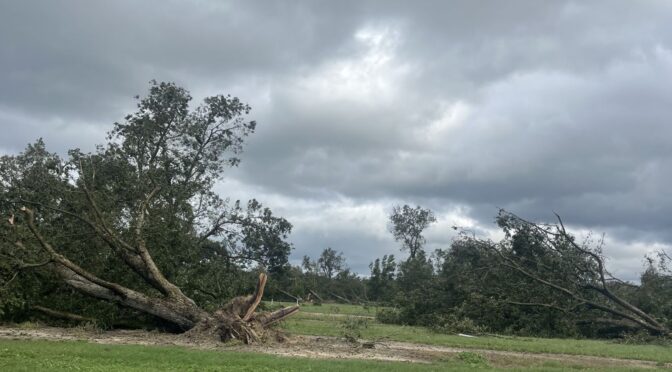Hurricane Helene has devastated much of the Southeast. SESE’s headquarters escaped unscathed, but we are deeply saddened by the loss of life and the damage to family farms. We rounded up some resources designed to help farmers and growers as we head into recovery.
One of the most important things you need to do is document the damage. Gather evidence before beginning any clean-up. If possible, document damage with dated photographs, videos, and third-party verification (non-family if possible). This information can help you get the aid you deserve from various resources.
Keep notes on your damage, expenses, and repairs. Track:
- Damage
- Necessary repairs
- Costs associated with repairs
- Receipts for anything repair-related
If possible, put off repairs until you receive approval from the Farm Service Agency (FSA). Document any emergency repairs you must make, like fencing repairs for livestock.
Monitor Livestock Carefully
Any livestock exposed to flood waters should be monitored carefully in the coming weeks, even if they appear fine right now. Bacteria in flood waters can cause skin conditions and infections.
USDA Resources
Find and connect with your local USDA office here.
The USDA has a number of programs designed to help farmers recover from hurricane damage. Here are some of the ones you can look into:
Noninsured Crop Disaster Assistance Program (NAP)
NAP provides financial assistance when natural disasters cause low crop yields, crop loss, or delayed planting for uninsured crops.
Tree Assistance Program (TAP)
TAP assists orchardists and nursery growers in replanting or rehabilitating eligible trees, bushes, and vines damaged by natural disasters.
Emergency Assistance for Livestock, Honey Bees, and Farm-raised Fish (ELAP)
ELAP provides financial assistance to qualifying farmers who have lost animals, honeybees, or farm-raised fish during certain natural disasters.
Livestock Indemnity Program (LIP)
LIP provides assistance to farmers who have had an excess of livestock deaths due to natural disasters. LIP payments are equal to 75 percent of the average fair market value of the livestock.
The Environmental Quality Incentives Program (EQIP)
EQIP is a conservation program that provides financial and technical assistance to farmers, ranchers, and forest landowners to integrate conservation into working lands. It may be used for hurricane recovery in several ways, including obstruction removal, clearing and snagging, land smoothing, repair of access roads, and repair of fences for prescribed grazing and protecting sensitive areas.
Emergency Forest Restoration Program (EFRP)
EFRP is designed to help landowners restore forest health damaged by natural disasters.
Apply for FEMA
FEMA isn’t specifically for farmers, but it can help anyone, including farmers, with serious issues like displacement, temporary lodging, basic home repair costs, personal property loss, or other disaster-caused needs.
There are several ways to apply: Go online to DisasterAssistance.gov, use the FEMA App, or call 800-621-3362 from 7 a.m. to 11 p.m. ET daily. The telephone line is open daily, and help is available in most languages. If you use a relay service, such as Video Relay Service (VRS), captioned telephone, or other service, give FEMA your number for that service.
To view an accessible video on how to apply, visit Three Ways to Apply for FEMA Disaster Assistance – YouTube.
RAFI (Rural Advancement Foundation International)
RAFI has information about farm emergency preparedness and disaster relief for farms affected by natural disasters. Visit their website.
Appalachian Sustainable Development Resource Page
Appalachian Sustainable Development has a developed a list of Emergency Resources that is available on their website.
Assistance for the Carolinas
Carolina Farm Stewardship Association
The Carolina Farm Stewardship Association has put together a running list of resources that may help growers in the Carolinas and beyond move forward with recovery. Be sure to check back in as they update their list.
Meade Tractor
See the full description under Virginia heading to apply for equipment assistance.
Florida Farm Relief
The Florida Department of Agriculture and Consumer Services (FDACS) offers low-interest or interest-free loans to agricultural and aquaculture producers with damage from natural disasters.
They are now accepting applications for producers who experienced damage in Hurricane Helene or Hurricane Debby.
Georgia Farm Relief
Georgia Department of Agriculture
Georgia Agriculture Commissioner Tyler Harper has sent a letter asking Georgia’s congressional delegation to immediately provide aid to farmers. In the letter, he requests federal aid through a Block Grant to the State of Georgia rather than the pre-existing relief programs. Hopefully, we hear more soon.
~The Georgia Agriculture Department~
Tennessee Farm Relief
The University of Tennessee Extension has compiled a list of resources to assist farmers and individuals in Tennessee impacted by Hurricane Helene. They also encourage all farmers to contact their county extension agency.
Virginia Farm Aid
Smyth County Virginia Cooperative Extension
The extension encourages Smyth County farmers to contact them on Facebook and report losses, including hay, fences, barns, animals, etc. They ask that you include your name, address, description of loss, approximate value, and whether you had insurance.
121 Bagley Circle, Suite 434, Marion, VA 24354 – 276-783-5175
Meade Tractor
Meade Tractor has started a Crisis Response Program for farmers affected by flooding in Asheville, NC, Tri-Cities, TN, and Southwest Virginia. The program provides access to a fleet of tractors, loaders, and other essential equipment at no cost to impacted farmers and on-site training from Meade Tractor’s skilled team to ensure the equipment’s safe and efficient operation.
This information has been gathered from other state, federal, and organization websites. SESE does not work with or support these programs. All of their decisions are their own. The hope is to gather helpful resources for folks. We will update this list as we come across more information in the coming weeks.
How Can I Help?
If you want to donate money, supplies, or your time to hurricane relief efforts, check in with the Carolina Farm Stewardship Association. They have created a Running Resources list including some great ways you can get involved.

